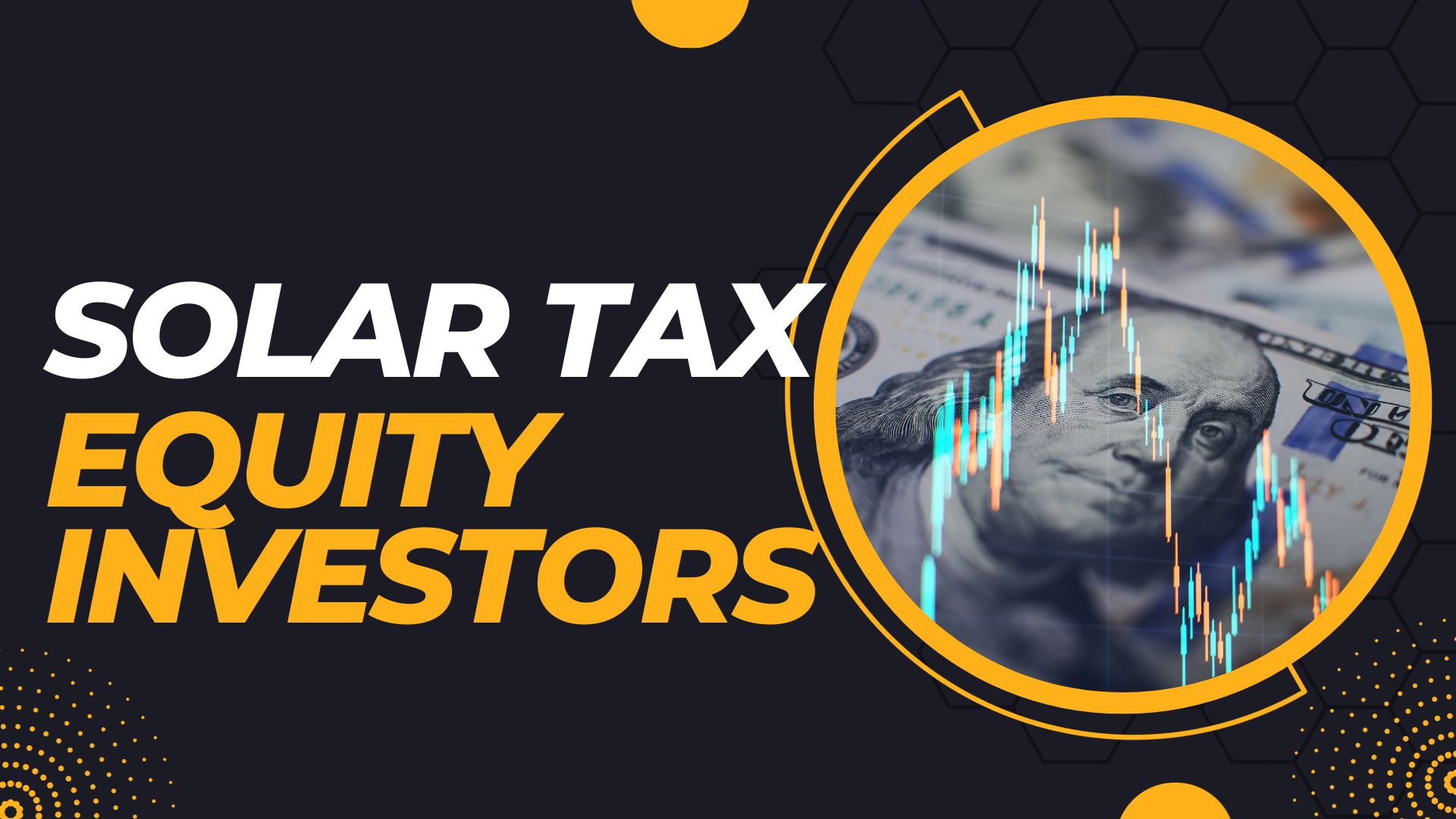Solar tax equity investors are individuals or entities that provide investment capital for renewable energy projects in exchange for tax benefits. They play a crucial role in financing solar projects by allowing project developers to monetize the federal Investment Tax Credit (ITC).
These investors can include insurance companies, banks, corporate bodies, and even wealthy individuals seeking a low-risk investment opportunity. By investing in solar projects, they can leverage the tax benefits associated with renewable energy to maximize their returns and minimize their risk.
Understanding Solar Tax Equity Financing
Understanding Solar Tax Equity Financing is essential for those considering investing in renewable energy projects. So, what exactly is Solar Tax Equity Financing? It is a financing approach that allows investors to take advantage of federal tax benefits associated with renewable energy projects, particularly solar.
In simple terms, tax equity for solar works by investors providing capital to developers who are looking to finance solar projects. These investors benefit from tax credits, deductions, and accelerated depreciation, which helps to offset their tax liability.
So, who can be a tax equity investor? Tax equity is considered a passive investment, and it can be made by a variety of entities, including insurance companies, corporate bodies, banks, and even wealthy individuals. These investors are banking on receiving a target internal rate of return based on the current federal tax benefits.
Let’s take a look at an example of solar tax equity. Imagine a solar developer seeking financing for a solar project. A tax equity investor provides the necessary funds and, in return, receives the tax benefits associated with the project. This arrangement allows the developer to secure funding and helps the investor to reduce their tax liability.
Tax Equity Structures In The Renewable Energy Sector
| Tax Equity Structures in the Renewable Energy Sector |
|
Tax equity structures play a crucial role in the US renewable energy sector. One common structure is the tax equity flip, which allows investors to benefit from the tax incentives associated with renewable energy projects. In this structure, the developer partners with a tax equity investor who contributes capital to the project in exchange for the tax benefits. Typically, the investor receives a fixed return until a predetermined target is reached. Once the target is met, the tax equity flip occurs, and the investor’s return increases.
Tax equity investors in solar projects can be diverse, including insurance companies, corporate bodies, banks, and wealthy individuals. These investors see tax equity as a passive investment opportunity, where they can earn a target internal rate of return based on federal tax benefits. Understanding tax equity structures in the renewable energy sector is crucial for developers and investors alike. By leveraging these structures, developers can secure funding for their projects, while investors can take advantage of the tax incentives and generate attractive returns. It is essential to work with experienced professionals who can guide you through the complexities of tax equity structures and ensure compliance with relevant regulations. |
Identifying The Largest Solar Tax Equity Investors
| Identifying the Largest Solar Tax Equity Investors |
|
Solar tax equity investors play a crucial role in the financing of renewable energy projects. These investors contribute large sums of capital to projects in exchange for tax benefits. So, who are the largest solar tax equity investors?
Tax equity investors can include insurance companies, corporate bodies, banks, and wealthy individuals. They are attracted to the potential returns and tax benefits that come with investing in solar projects. Additionally, these investors often have sustainability goals that align with renewable energy investments. It’s important to note that tax equity is considered a passive investment. Investors rely on receiving a target internal rate of return based on the current federal tax benefits. Some notable solar tax equity investors include IRA (Changing the tax equity game), Patriot Renewable Tax Credit, and Tax Equity Advisors. These organizations specialize in facilitating tax equity deals for renewable energy projects, and they provide comprehensive solutions that maximize returns and minimize risk. In conclusion, identifying the largest solar tax equity investors is crucial for developers seeking financing for their renewable energy projects. These investors play a vital role in supporting the growth of the solar industry and contribute to the development of a more sustainable future. |
Frequently Asked Questions On Solar Tax Equity Investors
Who Are The Largest Solar Tax Equity Investors?
The largest solar tax equity investors include insurance companies, corporate bodies, banks, and wealthy individuals.
How Does Tax Equity For Solar Work?
Tax equity for solar works by attracting investors who receive tax benefits in return for financing solar projects.
Who Can Be A Tax Equity Investor?
Tax equity investors can include insurance companies, corporate bodies, banks, and wealthy individuals.
What Is An Example Of Solar Tax Equity?
Solar tax equity is an investment strategy where investors, such as insurance companies or banks, invest in solar projects to benefit from federal tax incentives.
Conclusion
Tax equity investing is a valuable and low-risk method for investing in solar projects. By utilizing project finance, investors can maximize returns and minimize risk. Tax equity investors come from a variety of backgrounds, including insurance companies, corporate entities, banks, and wealthy individuals.
These investors rely on the current federal tax benefits to achieve their target internal rate of return. With the potential for a reliable and substantial return on investment, solar tax equity financing is an attractive option in the renewable energy sector.
Understanding the tax equity structures and the role of investors is crucial for developers and project managers looking to finance their solar projects. By leveraging tax equity investment, the renewable energy industry can continue to grow and make significant strides towards a more sustainable future.

Karon Smith stands as a distinguished figure in the world of online business, showcasing a profound expertise in navigating the digital landscape. With a background firmly grounded in business strategy and technology, Karon Smith has emerged as a seasoned online business expert. Her career is marked by an adept understanding of e-commerce, digital marketing, and the intricacies of online operations. Known for her innovative approaches to building and scaling online ventures, Karon Smith has been a guiding force for businesses seeking to thrive in the digital realm. Her insights into the ever-evolving dynamics of online markets, coupled with a keen eye for emerging trends, make Karon Smith a valuable contributor to the evolving narrative of online entrepreneurship. As an advocate for strategic digital transformation, she continues to influence and shape the online business landscape, providing invaluable guidance to those navigating the complexities of the digital business world.


